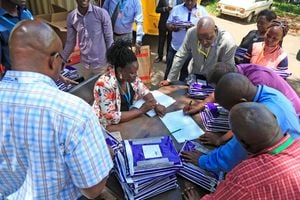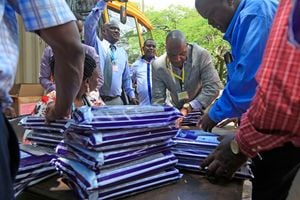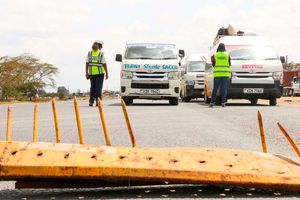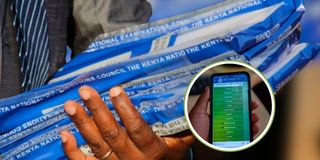
Government officials oversee the distribution of KCSE examination papers at Kiawara Police Station in Nyeri County on November 4, 2024.
Parents, students, and teachers have lost millions of shillings to fraudsters luring them with the promise of delivering to them advance Kenya Certificate of Secondary Education (KCSE) examination papers, an investigation by the Saturday Nation has established.
The gullible clients are enticed with promises of being supplied with the ongoing KCSE examination questions ahead of the scheduled examination time to give them an advantage over other candidates.
The price per paper ranges from Sh2,500 to Sh18,000 for a full package containing all the examination papers and answers.
The administrators of the online platforms appear to be tech-savvy individuals who have programmed automated channels on social media that appear authentic to the unsuspecting eye.
Those interested have been given the option of purchasing single papers or subscribing to a VIP channel to purportedly access all the examination papers and answers.
However, the Nation investigation established it as a scam to defraud people who want to cheat their way to attaining good grades.
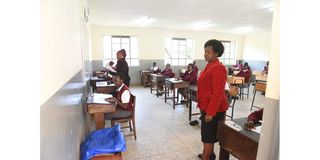
An invigilator distributes examination papers to this year's Kenya Certificate of Secondary Education candidates at Moi Girls High School in Eldoret City, Uasin Gishu County, to tackle English Paper One as the school's Chief Principal Juliana Kirui (right) looks on, on November 04, 2024.
The channel most preferred by the scammers is Telegram because of its security and end-to-end encryption features, which hide the identity of persons operating the fraudulent accounts.
Membership to one of the most-used channels on Telegram that we have been observing, KCSE Leakages 2024, rose from 50,000 Monday to 75,000 in four days— a clear indication of the high interest that people have in cheating their way to success.
On Friday, administrators of the group claimed that they had sent the Chemistry Paper 3 to 3,589 people and rejected the payments of 76 others.
At the price of Sh3,500, this translates to Sh12.5 million in a single day. Assuming only half these opted for the VIP channel, this translates to Sh32.3 million.
The Kenya National Examinations Council (KNEC) Act 29 of 2012 prohibits illegal access to examinations materials. Section 4.2 of it states:
“Any person who: a) gains access to examination material and knowingly reveals the contents, whether orally or in writing, to an unauthorised party, whether a candidate or not, will be in violation of Section 27 of the Act and the penalty will be imprisonment for a term not exceeding ten years, or a fine not exceeding two million shillings or both.”
For the period that Nation has been observing since the start of the examinations, the scammers post images of examination papers for the day just a few minutes after the examination begins at 8am.
The images bear an earlier timestamp to convince would-be buyers that they are genuine, leaked exam papers. The Nation could not authenticate the timestamps.
This year, KNEC has personalised the examination materials as a security feature. The exams body has also not printed any extra papers. The images, therefore, point to people who have access to the materials.
On Tuesday, we set out to buy the Kiswahili Paper 1, which was to be administered on Wednesday by paying the Sh2,500 required, with a promise that the paper would be delivered by 4.00 am on Wednesday.
To hide their identity, the scammers advise the ‘client’ to pay through the USSD code *334# rather than use a mobile money app.
Payment screenshot
The operators of the channel then ask the ‘client’ to take a screenshot of the payment and send it for verification of the payment and then await delivery of the examination material before the examination begins.
We made the payment and it went through to an Airtel account number 108290505 that is registered in the name of Benard Kibet and sent the screenshot to the Telegram channel operators.
“Thank you for sending the screenshot. Please wait while we verify the payment,” came back an automated message.

Cybersecurity experts are warning consumers not to assume that every deal they chance upon online is legit.
At 02.37am, a message came through that read: “Uploading Kiswahili PAPER 1...”
However, by the time of going to press, the paper had not been delivered. Unlike other days, the app has had downtime and has largely been inaccessible.
At the same time on Tuesday, we also paid a discounted price of Sh12,000 to access the VIP channel.
This time around, the money was routed to another Airtel account number 100257943 registered under the name Amos Langat. Like in the previous case, no examination papers were delivered despite the operators of the accounts sending images of papers shortly after the official opening time.
Since the downtime started on Thursday, access to the app has been restricted to VPN, which bypasses local Internet service providers. On Friday, payments were going to yet another Airtel account number 0108056061, registered under the name Victor Nyabuto. Airtel Kenya had not responded to our queries by the time of going to press.
KNEC Chief Executive David Njeng’ere, in response to Nation queries, dismissed allegations of exam leakage, calling the reported incidents of abuse of technology.
“The case that you saw are persons who picked [up] the papers from the container, and then along the way, they opened and started taking photos. We shouldn’t abuse technology; we should use it for the benefit of learning but not to abuse the process,” he said while monitoring the examinations in Isiolo County.
Dr Njeng’ere said, unlike before, the government has not marked any areas as ‘cheating hotspots’ to avoid stigmatising candidates.
“Those individuals who participate in those activities are the ones we’ll sanction, not regions,” he said.
Last year, the Directorate of Criminal Investigations and the Communications Authority of Kenya reported that they had brought down 49 social media accounts that were involved in examination cheating.
The two agencies blamed some workers within the government for complicity in the matter when they presented their findings to the National Assembly Education Committee.
“We have good information, which touches on various sectors of the Ministry of Education. We found out how individuals opened social media platforms and the kind of information they shared,” said Julius Melly, the chair of the committee.
Speaking on Friday at the Kikuyu Deputy County Commissioner’s office in Kiambu, where he monitored the administration of the examinations, Basic Education PS Belio Kipsang sounded a warning to examination cheats, especially officials involved in the vice.
“To risk your career to the extent that you do some of these things, you’re being suicidal. So far, we’ve run quite a good exam.
"The number of attempted sneaking in of phones is very minimal compared to any other year. This has been one of our best years in terms of doing exams the right way,” he said.

